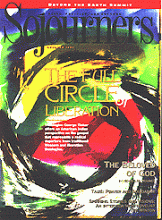Brazilian theologian Leonardo Boff announced this summer that he is leaving the Catholic priesthood - but not the church - "to be free to continue working without impediments." Boff decried the "cruel and merciless" hounding by doctrinal authorities of the Vatican, who "became like an ever-tightening tourniquet rendering my work as a theologian, teacher, lecturer, adviser, and writer almost impossible."
Boff, author of 35 books and a leading proponent of liberation theology, has been a long-time critic of the church's hierarchical structures. "Rome is afraid of a more popular church," he told The Washington Post in July. "It wants everything centralized around the bishops and priests. But people want their priests to inspire them, not just accumulate power."
In his 1984 book Church: Charism and Power, Boff wrote that the church's hierarchical structure was not intended by Christ and that authority can spring from the community of the faithful. The Vatican's doctrinal enforcement agency, the Congregation for the Doctrine of the Faith (CDF), branded the book as "dangerous" and ordered Boff to refrain from teaching or writing for one year.
The theologian's differences with the church, however, apparently stemmed more from Boff's political opinions than his criticism of church structures. "We have to think of theology in Latin America from the struggles and suffering of the people, such as the base Christian communities," Boff said in a July interview with Latinamerica Press. "This line of thinking...causes fear in the Vatican." Cardinal Joseph Ratzinger, the Vatican's vicar of doctrine, has called liberation theology "a fundamental threat to the faith of the church."
Read the Full Article

